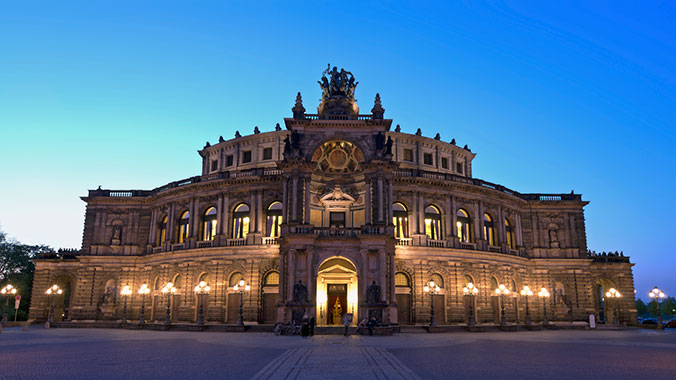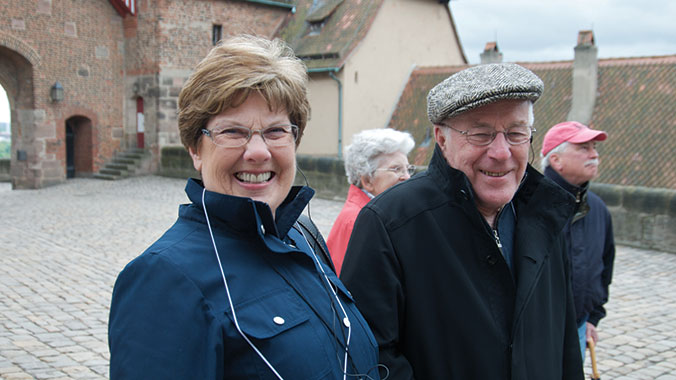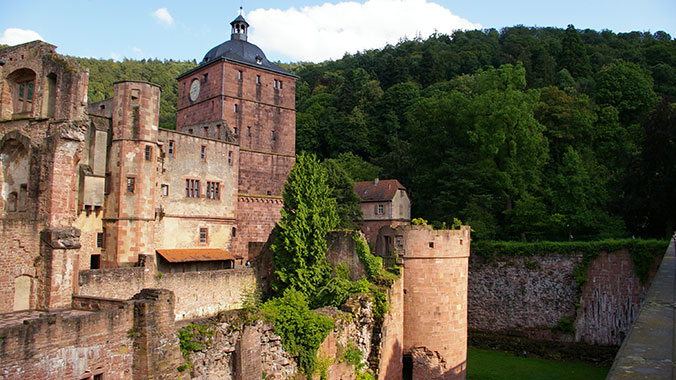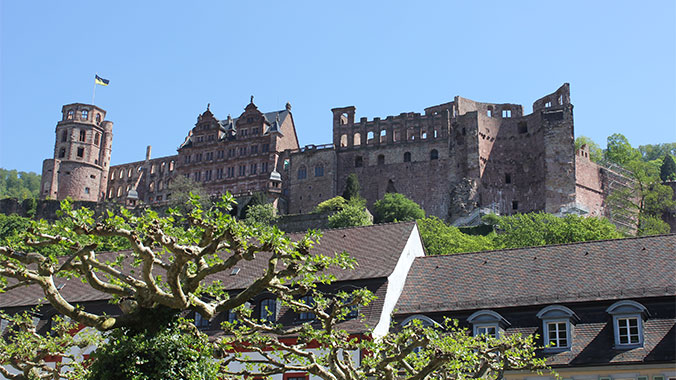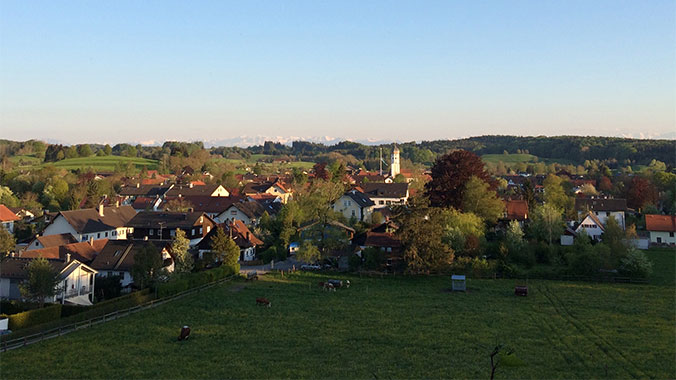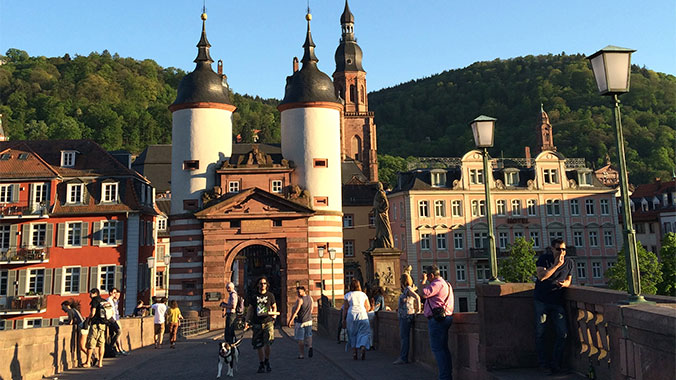Germany
The Best of Germany: Grand Cities, Castles and the Romantic Rhine
Program No. 19454RJ
From grand cathedrals to ancient castles, from Bavarian villages to a historic summer palace, come explore the monuments and culture of Germany on this comprehensive learning adventure.
Itinerary
While we make every effort to ensure the accuracy of our published materials, programs are typically advertised more than a year prior to their start date.
Read More.
While we make every effort to ensure the accuracy of our published materials, programs are typically advertised more than a year prior to their start date. As a result, some program activities, schedules, accommodations, personnel, and other logistics occasionally change due to local conditions or circumstances. Should a major change occur, we will make every effort to alert you. For less significant changes, we will update you during orientation. Thank you for your understanding.
Duration
17 days
16 nights
What's Included
33 meals (
15B, 11L, 7D
)
3 expert-led lectures
19 expert-led field trips
1 hands-on experience
1 performance
An experienced Group Leader
15 nights of accommodations
Taxes and customary gratuity
Road Scholar Assurance Plan
Day
1
In Transit to Program
Location:
In Flight
Day
2
Arrive Berlin, Check-in, Orientation, Welcome Dinner
Location:
Berlin
Meals:
D
Stay:
Maritim proArte Hotel Berlin
Activity Note
Hotel check-in available from 3:00 p.m. Early arrivals may leave their luggage with the hotel concierge until rooms are ready. Remember to bring your nametag (sent previously).
Afternoon:
After hotel arrival and check-in, take some time to freshen up and relax before our Orientation session. The location will be posted. If you arrive early, take a walk around the neighborhood or have a light lunch at one of the many restaurants nearby. Orientation: 4:30 a.m. The Group Leader will greet everyone with a warm welcome and lead introductions. We will review the up-to-date program schedule and any changes, discuss roles and responsibilities, logistics, safety guidelines, emergency procedures including contact numbers for key staff, and answer any questions you may have. All transfers and transportation will be provided via motorcoach unless specified otherwise. Please note that in Germany it is expected to pay for using public restrooms with small change; we advise carrying 50c pieces with you during field trips. Estimated times for travel and transfers depend on traffic and local conditions at the time of the program. Periods in the schedule designated as “Free time” and “At leisure” offer opportunities to do what you like and make your experience even more meaningful and memorable according to your personal preferences. The Group Leader will be happy to offer suggestions. Program activities, schedules, personnel, and indicated distances or times may change due to local circumstances/conditions. In the event of changes, we will alert you as quickly as possible. Thank you for your understanding.
Dinner:
At the hotel restaurant.
Evening:
At leisure. Continue getting to know your fellow Road Scholars, settle in, and get a good night’s rest for the day ahead.
Day
3
Introduction to German Language, City Motorcoach Field Trip
Location:
Berlin
Meals:
B,L
Stay:
Maritim proArte Hotel Berlin
Activity Note
Getting on/off a motorcoach several times; driving about 5 miles, approximately 5 hours total riding time including stops. Short walks to and standing at field trip sites; cobblestones. The specific sites seen during our motorcoach field trip will depend on schedules and local conditions at the time of the program.
Breakfast:
In the hotel dining room.
Morning:
Our Group Leader will continue the program introduction, and we’ll be joined by a language teacher who will give an introduction to German language and culture. We’ll then board a motorcoach with another expert for a field trip to see some of the city’s highlights including the Berlin Wall monument, Checkpoint Charlie, Gendarmenmarkt Square with the restored Konzerthaus and the French and German churches, Paris Square and the Brandenburg Gate, the Reichstag, Holocaust Memorial, Potsdamer Square (the new and old), Memorial Church, and new architecture.
Lunch:
At a pleasant spot during our field trip, we’ll stop and have packed lunches.
Afternoon:
We will continue to explore Berlin aboard the motorcoach, visiting and learning more about some of the city’s key sites.
Dinner:
This meal has been excluded from the program cost and is on your own to enjoy what you like. The Group Leader will be happy to offer suggestions.
Evening:
At leisure.
Day
4
German Politics, Reichstag, Performance
Location:
Berlin
Meals:
B,D
Stay:
Maritim proArte Hotel Berlin
Activity Note
Walking up to 2 miles at different sites; standing, climbing flights of stairs. Walking and other free time activities according to personal choice.
Breakfast:
At the hotel.
Morning:
We will begin the morning with a lecture and political discussion round led by a political expert. Afterwards, we will take a walking field trip from the hotel to one of the city’s most famous landmarks, the former Reichstag building that is now the seat of the Deutscher Bundestag, the German Federal Parliament. As we explore the building, we will see and appreciate the magnificent architecture, and also learn more about Germany’s turbulent political past — and that mysterious 1933 fire! — before ascending to the recently rebuilt glass cupola. From here, you can enjoy spectacular views of the parliamentary and government district and Berlin’s sights.
Lunch:
On your own to explore local fare.
Afternoon:
Free time. Take this opportunity for personal independent exploration to see and do what interests you most. Please refer to the list of Free time Opportunities at the end of the daily schedule. The Group Leader will be happy to offer suggestions. We recommend visiting famous Museum Island, a UNESCO listed World Heritage site. Its five museums include exhibitions spanning the whole of Western Civilization from pre-historic to the 19th century.
Dinner:
At a local restaurant.
Evening:
We will attend an evening performance.
Day
5
Potsdam, Cecilienhof Palace, Free Time
Location:
Berlin
Meals:
B,L
Stay:
Maritim proArte Hotel Berlin
Activity Note
Getting on/off a motorcoach several times; driving about 45 miles, approximately 4 hours riding time including short stops. Walking up to 2 miles, standing around palace. Walking and other free time activities according to personal choice.
Breakfast:
At the hotel.
Morning:
Our morning field trip via motorcoach takes us to Potsdam and the historic Cecilienhof Palace, the last palace built by the ruling Hohenzollern family from 1914-17 for Crown Prince William and his wife, Cecilie von Mecklenburg-Schwerin. World history was forged when Allied leaders Truman, Churchill, and Stalin met here for the Potsdam Conference in 1945 to discuss the partition of Germany.
Lunch:
At a local restaurant.
Afternoon:
Return to Berlin by motor coach and leisure time.
Dinner:
On your own to enjoy local fare.
Evening:
At leisure.
Day
6
Transfer to Dresden, City Walk Dresden
Location:
Dresden
Meals:
B,L
Stay:
Maritim Hotel & Internationales Congress Center Dresden
Activity Note
Getting on/off a motorcoach; driving about 120 miles, approximately 2 hours riding time depending on traffic. Walking up to 2 miles and standing, approximately 2.5 hours; cobblestones, climbing stairs.
Breakfast:
At the hotel.
Morning:
After checking out of the hotel, we will board the motorcoach for the transfer to Dresden, arriving at our hotel for lunch. Once a small fishing village, Dresden slowly developed and became the capital of the Margrave of Meissen in the 13th century. As families tussled for power and divided from within, Dresden became the seat of the Albertine court and gained electoral privileges 56 years later in 1547 following a regional war. As the city continued to develop, its breathtaking architecture and artistic heritage earned Dresden much praise, including from Wolfgang von Goethe, who visited the city no less than four times.
Lunch:
At a local restaurant.
Afternoon:
A local expert will meet us at the restaurant and lead our walking field trip in Dresden that provides an overview of the Old Town and sites including the Frauenkirche — Church of Our Lady — the Zwinger, Brühl’s Terrasse, Procession of Princes, Dresden Castle, and the New Synagogue. The Frauenkirche has been one of Dresden’s spiritual landmarks since the 11th century. The splendid Baroque church that replaced the old Gothic edifice in the 18th century was one of city’s foremost architectural landmarks until 1945. Dresden was virtually destroyed by the massive Allied bombing campaign against Nazi Germany in the final stages of World War II. The Frauenkirche was among the casualties, its ruins standing for decades as a symbol of war’s destruction. Sentiment slowly grew for a restoration of the great church as a memorial to peace. It was restored piece by piece and reconsecrated in 2005 before an audience of 60,000 people with millions watching on television. After the field trip we will check-in the hotel.
Dinner:
On your own.
Evening:
At leisure.
Day
7
Royal Palace & Green Vault, Semperopera, Free Time
Location:
Dresden
Meals:
B,L
Stay:
Maritim Hotel & Internationales Congress Center Dresden
Activity Note
Walking up to 2 miles and standing for about 2.5 hours; cobblestones, climbing stairs. Walking and other free time activities according to personal choice.
Breakfast:
At the hotel.
Morning:
As a special highlight, we will have an expert-led field trip to see the Semperoper near the Elbe River in the historic center of Dresden, another Dresden institution devastated by the 1945 bombing and later resurrected. It was long one of the finest opera houses in Europe, called “Semper” for its designer, Gottfried Semper, after opening in 1841. It took 40 years after World War II, but the building was completely reconstructed and reopened in 1985. It has continued to present some of the world’s greatest musical artists. Afterwards, we will visit the Royal Palace with a local expert. After this, you can visit the "Historic Green Vault," on your own, one of Europe's finest treasure collections, recently reopened after 68 years. It was amassed by Augustus the Strong, the 18th-century Prince of Saxony.
Lunch:
At a local restaurant.
Afternoon:
Free time. We recommend visiting one or more of the city’s 30 museums, many of them world-class institutions. The Group Leader will be happy to offer suggestions.
Dinner:
On your own.
Evening:
At leisure. Prepare for check-out and transfer to Nuremberg in the morning.
Day
8
Nuremberg, Mödlareuth (Little Berlin), Imperial Castle
Location:
Nuremberg
Meals:
B,L,D
Stay:
Hotel NH Collection Nürnberg City
Activity Note
Getting on/off a motorcoach; driving about 200 miles, approximately 4.5 hours riding time depending on traffic. Steep walk to Imperial Castle, cobblestones during city exploration; participants may take a taxi at an additional cost if the walk to too steep.
Breakfast:
At the hotel.
Morning:
Checking out of the hotel, we will transfer to Nuremberg by motor coach. On the way we will stop at the village of Mödlareuth - also known as "little Berlin". Mödlareuth is a village of 50 inhabitants which was divided right in the middle by the wall during the Cold War. Until today parts of the wall and border fortifications have been kept as a museum where you will have some time to explore on your own. Afterwards we will continue our journey to Nuremberg.
Lunch:
At a local restaurant near the Nuremberg Imperial Castle.
Afternoon:
After lunch we will meet a local expert who will take us on an exploration of Nuremberg's old town including an outside visit of the Imperial Castle, one of the greatest medieval monuments in Europe. The exact date of its original construction in the 11th Century is unknown but it was expanded beginning in 1140 and continued to grow during the following centuries. It served as the royal residence of the Holy Roman Empire for nearly 500 years and became the symbol of Nuremberg until it was nearly destroyed in World War II; the castle has been since restored to its former glory as one of the most formidable medieval fortresses in Europe. We’ll also see the St. Sebaldus Church, the Church of Our Lady, the exterior of the Albrech Dürer House, the main market square, and the beautiful 14th century fountain. After the city walk enjoy some leisure time to check-in relax before dinner.
Dinner:
At a local restaurant.
Evening:
At leisure.
Day
9
Nuremberg Trials, Nazi Party Rally Grounds, drive to Munich
Location:
Munich
Meals:
B,L
Stay:
Four Points by Sheraton Munich Arabellapark
Activity Note
Getting on/off a motorcoach, driving about 98 miles, approximately 2.5 hours depending on traffic.
Breakfast:
At the hotel.
Morning:
Checking out of the hotel, we’ll ride to the Memorium of the Nuremberg Trials for our next field trip in the company of a local expert. Held from 1945 to 1949, the Nuremberg Trials prosecuted German war criminals, setting precedent for dealing with crimes against humanity going forward. Afterwards we will continue by motor coach for an expert led visit of the Nazi Party Rally Grounds.
Lunch:
At a local restaurant near the lake.
Afternoon:
We will depart Nuremberg by motorcoach and transfer to Munich. On the bus, we will be joined by a local expert who will give a lecture on Munich and Bavaria in Modern History. After arriving in Munich we will check-in and have some leisure time before dinner.
Dinner:
On your own.
Evening:
At leisure.
Day
10
Munich Walking Field Trip, Leisure time
Location:
Munich
Meals:
B,L
Stay:
Four Points by Sheraton Munich Arabellapark
Activity Note
Walking up to 3 miles, cobblestone streets, extensive standing.
Breakfast:
At the hotel.
Morning:
Led by our local expert, we’ll depart on foot for an exploration of the city. One of the highlights is the Marienplatz, named for a golden statue of the Virgin Mary, which also features the world’s most famous glockenspiel with life-size figures or the English Garden, the Cathedral of our Blessed Lady, and the Viktualienmarkt.
Lunch:
At a local restaurant.
Afternoon:
Free Time to see and do what interests you most.
Dinner:
On your own.
Evening:
At leisure.
Day
11
Nymphenburg Palace, Andechs Abbey
Location:
Munich
Meals:
B,L,D
Stay:
Four Points by Sheraton Munich Arabellapark
Activity Note
Walking up to 2 miles through the palace and gardens; stairs, uneven surfaces. Getting on/off a motorcoach to Andechs Abbey (55 miles, 2 hours total riding time), walking up to 1 mile on uneven surfaces in and around Andechs Abbey.
Breakfast:
At the hotel.
Morning:
This morning we will depart by public transportation for another special highlight of our program, Nymphenburg Palace in the western part of Munich, where we will explore with a local expert. Begun in 1664, it was for many years the principal summer residence of Bavaria’s rulers. The palace is considered a unique synthesis of artistic achievement in baroque architecture and garden design. It is one of the largest palaces in Europe; the Italianate façade alone is more than 2,000 feet (700 meters) long. The complex of palace and landscaped garden park is beloved by Munich’s residents and visitors alike.
Lunch:
At a restaurant near the palace.
Afternoon:
Next, we’ll board a motor coach and ride southwest of Munich to the renowned pilgrimage Andechs Abbey—oldest in Bavaria—sits atop the “heilige Berg” (holy mountain) high above Lake Ammer. A Benedictine monastery since 1455, the monks have brewed beer in the traditional Benedictine style and preserves the monastic style. This brewery annually produces more than 2.5 million gallons of premium beers. We will begin our field trip with an expert led exploration of the church, followed by the brewery. Atop of the holy mountain, one of the church’s defining visual feature is “flamboyant Baroque” architecture. In the brewery we will enjoy a beer tasting of the locally made beers.
Dinner:
At the Abbey restaurant.
Evening:
Returning to Munich, the remainder of the evening is at leisure.
Day
12
Art District, Pinakothek Museums
Location:
Munich
Meals:
B,L
Stay:
Four Points by Sheraton Munich Arabellapark
Activity Note
Walking up to 2 miles; extensive standing in the museum.
Breakfast:
At the hotel.
Morning:
This morning we will go by public transportation to the museum district of Munich. The Alte Pinakothek and Neue Pinakothek (Old and New Picture Galleries) are two of the important galleries in the world. Led by an expert, we’ll explore the artistic treasures of the “old” Pinakothek which is indeed one of the world’s oldest galleries and was once the largest. Its magnificent collection consists of Old Masters from the 14th to the 18th centuries.
Lunch:
At a restaurant in the museum.
Afternoon:
Free Time. It is impossible to see everything in the Pinakothek galleries during our group visit, so you might like to spend some free time here. Alternatively, go visit the Nazi Documentation Center or return to the hotel and relax.
Dinner:
On your own to enjoy local fare.
Evening:
At leisure. Prepare for check-out and transfer to Heidelberg in the morning.
Day
13
Nördlingen, Heidelberg University
Location:
Heidelberg
Meals:
B,D
Stay:
Hotel Holländer Hof
Activity Note
Getting on/off a motorcoach; driving about 200 miles, approximately 4.5 hours riding time depending on traffic. Walking and standing on cobblestone sidewalks, stairs.
Breakfast:
At the hotel.
Morning:
After checking out of the hotel, we’ll transfer to Heidelberg. Late in the morning, we will stop in Nördlingen enjoy an epert-led city walk where we can see for example the medieval city wall. Afterwards enjoy some leisure time.
Lunch:
Enjoy local fare on your own in Nördlingen.
Afternoon:
We continue our transfer to Heidelberg, where a local expert will introduce us to the historic city and the university. Archaeological studies have found that the earliest evidence of human life near here (Homo Heidelbergensis) was more than 550,000 years ago! Much later, it was settled by Celts, then Romans, then Germanic tribes. The city’s name first appeared in 1196, and the university, the oldest in Germany, was founded in 1386. Led by an expert, we will stroll through venerable Heidelberg University that, like the city, has had its ups and downs over the centuries and today is once again an august temple of learning. We will visit the stately Alte Aula (Old Hall); the Karzer, a place of detention and incarceration for unruly students; the University Library with more than 90,000 academic texts and more than 3,000 on-line databases; and St. Peter's Church where many former professors and other prominent Heidelbergians are buried.
Dinner:
At a local restaurant.
Evening:
At leisure.
Day
14
Historic Heidelberg, Heidelberg Castle, Free Time
Location:
Heidelberg
Meals:
B,L
Stay:
Hotel Holländer Hof
Activity Note
Walking on cobblestone sidewalks, stairs, extensive standing.
Breakfast:
At the hotel.
Morning:
We’ll be joined by a local expert for a walking field trip into the Old Town. Heavily damaged by wars in the 17th century, Heidelberg was reconstructed in the 18th century and still reflects its baroque splendor, miraculously little harmed during two world wards. The rich and storied past lives on in its vibrant present. It has been designated a UNESCO City of Literature in recognition of its heritage in education and the literary arts. Highlights include the Church of the Holy Spirit and the old market square. From 13th century fort to international symbol of German Romanticism, the remains of Heidelberg Castle look out majestically over the Old Town. It was once one of Europe’s grandest palaces with gardens regarded as a masterpiece, but both suffered major damage due to wars and natural disasters. Efforts at the beginning of the 20th century saved it from further deterioration, and some of the interior rooms have been preserved. We will explore the grounds and remaining interiors with an expert and imagine what once was.
Lunch:
At a local restaurant.
Afternoon:
Free time. The afternoon is free to explore on your own or just relax.The Group Leader will be happy to offer suggestions.
Dinner:
On your own to enjoy what you like.
Evening:
At leisure. Prepare for our transfer in the morning.
Day
15
Bacharach, Rhine River-Loreley Valley
Location:
Mainz
Meals:
B,L,D
Stay:
Hilton Hotel Mainz
Activity Note
Getting on/off a motorcoach, driving about 90 miles, approximately 2 hours riding time depending on traffic. For the boat ride to Bacharach and Bingen please bring a warm jacket. Walking up to 2 miles; cobblestone sidewalks in Bacharach.
Breakfast:
At the hotel.
Morning:
Checking out of the hotel, we’ll transfer by motorcoach to St. Goar where we will embark on boat trip through the Rhine Valley. We'll enjoy beautiful landscapes of the Loreley Valley before disembarking in Bacharach. Of all the picturesque towns and villages on the Rhine River, this is one of the most charming, and retains much of its medieval atmosphere. One of the landmarks is the Wernerkapelle ruins, where a plaque displays a prayer by Pope John XXIII for tolerance and understanding. We’ll take a walk through the vineyards and village of Bacharach with a local expert.
Lunch:
At a vineyard in Bacharach, our lunch will include a wine tasting.
Afternoon:
We will continue our journey by boat to Bingen.
Dinner:
At a local restaurant.
Evening:
We will transfer to the hotel in Mainz and check in. The remainder of the evening will be at leisure.
Day
16
Explore Mainz by foot, Farewell dinner
Location:
Mainz
Meals:
B,D
Stay:
Hilton Hotel Mainz
Activity Note
Walking up to 2 miles. Walking and other activities during independent exploration according to personal choice.
Breakfast:
At the hotel.
Morning:
This morning we will embark on an expert-led walking field trip throughout the city of Mainz. Enjoy the famous romanesque cathedral, views of the many timber framed houses and medieval market places. Mainz is famous for being the birthplace of Johannes Gutenberg, the inventor of the modern printing press which revolutionized the method of book printing and made it available to the masses. We will also visit the Gutenberg Museum exclusively as it is normally closed on mondays.
Lunch:
On your own.
Afternoon:
Free Time to explore Mainz on your own before returning to the hotel in time to relax and freshen up before dinner.
Dinner:
At a local restaurant. Share your favorite experiences with new Road Scholar friends.
Evening:
At leisure. Prepare for check-out and departure in the morning.
Day
17
Program Concludes
Location:
In Flight
Meals:
B
Activity Note
Hotel check-out is by 11:00 a.m. See the “Transportation Information” section regarding transfers. If you are an independent traveler (POP status), see “Ground Transportation From Last Location.”
Breakfast:
At the hotel. This concludes our program. If you are returning home, safe travels. If you are staying on independently, have a wonderful time. If you are transferring to another Road Scholar program, detailed instructions are included in your Information Packet for that program. If you are returning home, safe travels. If you are staying on independently, have a wonderful time. If you are transferring to another Road Scholar program, detailed instructions are included in your Information Packet for that program. We hope you enjoy Road Scholar learning adventures and look forward to having you on rewarding programs in the future. Don’t forget to join our Facebook page and follow us on Instagram. Best wishes for all your journeys!
Please select a day to update the map
Map details are not available for this location.

